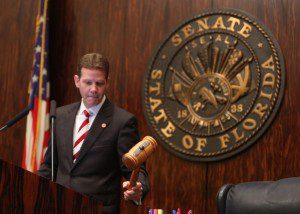This article by Greg Sargent, was first published on washingtonpost.com

A battle over the Medicaid expansion has erupted among Republicans in Florida, and it has created a strange situation: Republican legislators are urging GOP Governor Rick Scott to accept the expansion, but he is reluctant to do so, even though it is imperiling his drive for tax cuts.
Scott can’t seem to decide which priority is more important: Turning away federal money to expand health care for hundreds of thousands of his own constituents; or cutting taxes.
Okay, that’s a bit of a glib oversimplification. But it’s not really that far from what is really happening. In an interview with me, Republican state senate president Andy Gardiner — the leader of Senate Republicans, who wants the Medicaid expansion — essentially confirmed that the resistance to it is putting tax cuts, and the entire state budget, in peril.
“It really puts everything at risk,” Gardiner said. “It jeopardizes the tax cuts, it jeopardizes increases in education funding, it jeopardizes our priorities.”
The short version of the dispute is as follows. Florida has been negotiating with the Obama administration over expanding Medicaid in the state to some 800,000 people under the Affordable Care Act. But Governor Rick Scott seriously complicated things the other day when he pulled back his previous support for the expansion.
Scott did this in reaction to the fact that the federal government is on the verge of ending some of the billions in Medicaid funding for another program — the Low-Income Pool, or LIP — which funnels money to hospitals for low-income patients. The feds have said Florida should transition over to getting that money from the Medicaid expansion. But Scott argued that, because the feds are pulling back funding for LIP, that shows they can’t be trusted to follow through in providing federal money for the Medicaid expansion, which will eventually mean the state will be on the hook for its cost.
But this impasse is putting in jeopardy the negotiations that are currently underway over the state’s budget. Gardiner, the leader of state senate Republicans, says that without the federal money from either LIP (which is in doubt) or the Medicaid expansion (which is being offered, but being resisted by Scott and state House Republicans), the push for $673 million in tax cuts, as well as increases in education funding, “could be impacted.”
Scott worries that the battle over LIP suggests the feds can’t be trusted to fund the Medicaid expansion over time (even though the law requires the feds to fund 100 percent of the program at first and 90 percent of it in subsequent years). But Gardiner rejects Scott’s argument, noting that the version of the expansion put forward by state senate Republicans — a conservative, free-market version that utilizes the private market — explicitly ends the program if the feds reneg on their end of the bargain.
“Our bill is very clear — there is an automatic out if the federal government ever falls below that commitment,” Gardiner tells me.
Indeed, the dispute highlights just how hard it is to make a credible case against the Medicaid expansion on fiscal grounds — which in turn suggests that over time, other GOP-controlled states still holding out against it could find their resistance waning.
And this could also spill over into the dispute that could erupt in Florida if the Supreme Court guts subsidies for millions in states on the federal exchange. It turns out Florida will be hit harder than any other state: Approximately 1.5 million Floridians qualify for subsidies under Obamacare, meaning that ending those subsidies would mean pressure to set up an exchange to keep them going.
Gardiner tells me he thinks the state should be ready to act to do something to keep those subsidies going if the court guts them, and that accepting the state’s version of the Medicaid expansion — which Gardiner calls a “free market expansion” — right now could help lay the groundwork for the state to do that.
“Certainly we have to address that,” Gardiner says. “I’d like to have some kind of free market expansion in place right now. Depending on what the U.S. Supreme Court ruling is, if they give us the time to ramp up some type of state [response], then I’m certainly open to that.”
But would Governor Scott entertain setting up an exchange? “I don’t know,” Gardiner says. “You’d have to ask him.”
Greg Sargent writes The Plum Line blog, a reported opinion blog with a liberal slant — what you might call “opinionated reporting” from the left.



[…] far, lawmakers have not been able to devise a budget largely because it is unclear whether or not federal funding of $2.2 billion hospital funding […]